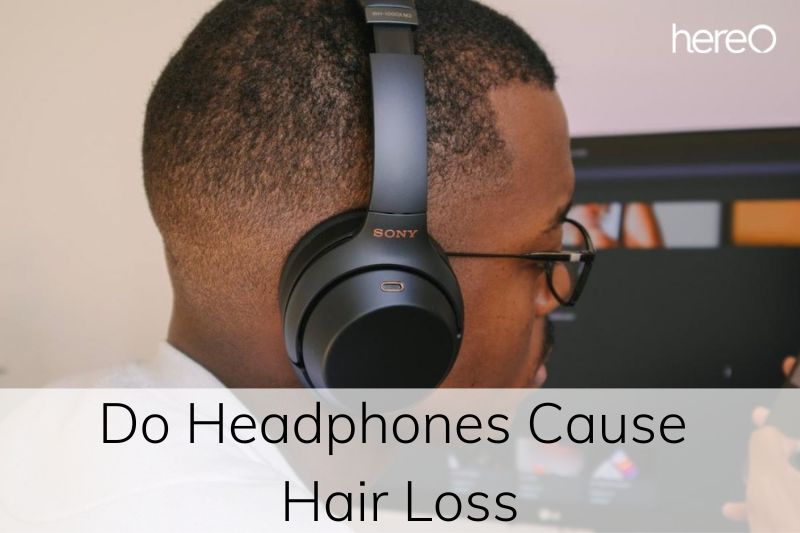One of the most influential audio devices ever made, headphones have completely changed how people listen to music and other media. Many individuals are worried about hearing loss from headphones, but some people are also worried about hair loss from headphones. So, do headphones cause hair loss?
Contents
Can Wearing Headphones Cause Hair Loss
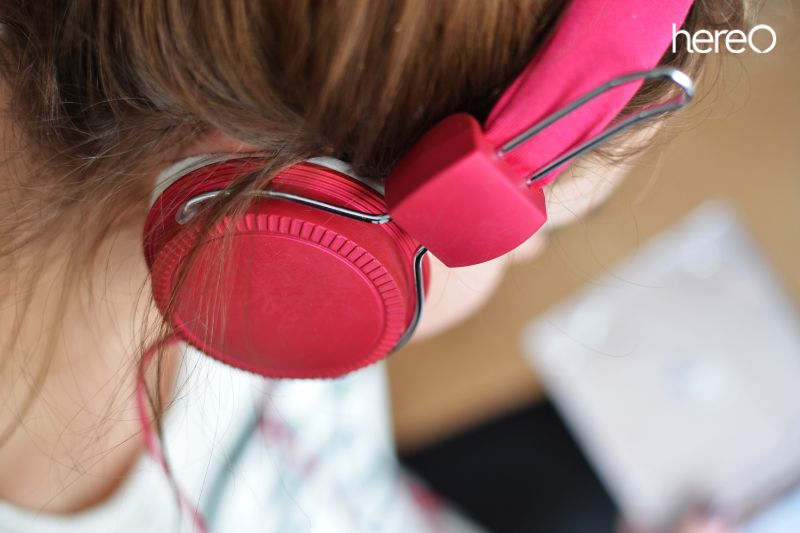
There has been no conclusive scientific study on the relationship between hair loss and headphone use. However, a brief online search on the topic reveals a wealth of anecdotal evidence from individuals who believe this has occurred to them.
The simple answer to this query is that yes, daily usage of headphones for extended periods of time can result in hair loss. Traction alopecia is the official medical term for this condition.
The phrase describes a condition in which a tight object pulls your hair straight out of the root and results in hair loss.
Medically speaking, traction alopecia is the term used to describe hair loss brought on by excessive headphone use. You keep shedding hair in this type of hair loss situation because of traction or friction from anything. It is the headphones in this instance.
You are basically yanking on your hair whenever you have to adjust your headphones. Your scalp experiences traction as a result. As soon as there is traction on the scalps, the hair follicles become disturbed. As a result, you start losing your hair.
If you use headphones nonstop for a lengthy period of time, this can happen to you. It won’t happen in a day or two.
What Kind Of Headphone Cause Hair Damage

Traditional headphones can harm hair if used too frequently. Two speakers that fit over each ear are attached to a tight band that wraps around the head in this design. Non-adjustable band headphones are more vulnerable to damage.
To lessen the chance of hair breakage or damage, many people choose to wear their headphone bands around their necks or behind their necks, but this may not be an option for musicians who need the band to be snugly fitted to their heads.
Direct-in-ear headphones do not contact hair and do not increase the risk of hair loss. Additionally, adjustable-band headphones are less likely to harm or cause hair loss.
It’s crucial to remember that although headphones with a nonadjustable band are more likely to sustain damage, the likelihood of major damage is very low and they only offer a real risk when they are used consistently.
How to Avoid Hair Loss From Wearing Headphones
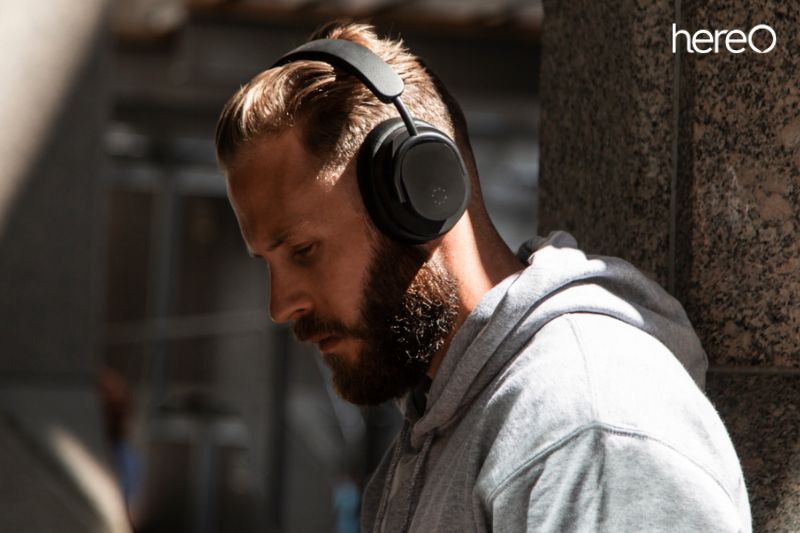
Change the Headphones position
You can currently attempt repositioning your headphones as a solution. Put the headband on your back rather than next to your scalp. This will cause the band to hang in midair without even coming close to your head.
Since it won’t make touch with your head, there won’t be any traction. You can prevent the whole traction alopecia problem as a consequence.
There are some things, though, that can stop you from doing that. Not every set of headphones enables you to accomplish this.
Some headphones are simply too hefty or won’t stay on your head’s back for this to function. You must then move on to the later solutions at that point.
Get Adjustable Headphones
Just get a pair of headphones with a movable band. What does that even mean? The band can be made wider, leaving space between your hairs and the band.
A gap isn’t always required; you can get away with just keeping them loose and resting them on your head. The band’s degree of looseness is the sole thing to watch out for in this scenario. Keep it loose, but not too loose, as this might occasionally hinder comfort.
Switch to In-Ear Headphones
You also have the fantastic choice of in-ear headphones. I don’t believe I need to elaborate too much on this. There won’t be any friction or traction because in-ear headphones won’t touch your head or hair.
In-ear headphones with a wireless design are referred to as earbuds. They provide a purpose that is comparable to that of in-ear headphones. The ease of being wire-free is also provided.
There are several problems with this. Not everyone should use in-ear headphones. Additionally, it can be challenging to get in-ear headphones that offer superior gaming quality if you are a player. In other words, finding the best in-ear headphones for you becomes challenging.
Take Short Break When Using Headphones
This is a solution that might cause controversy. You may be forced to use headphones for an extended period of time on occasion. I suggest taking pauses in these circumstances. In addition, avoid leaving your headphones on for longer than four hours at a time.
Wearing a Cap Under The Headphones
Try putting on a cap first, then the headphones if you need to wear them for an extended amount of time. You will find that wearing a cap will help you manage the issue much better.
Wear a cap, nevertheless, that doesn’t pull on your hair excessively or feel too tight on your head. You don’t want to risk further harm to your hair by doing this.
I think that purchasing headphones with an adjustable band is the most practical and hassle-free choice out of all of these. By doing it this way, you can utilize headphones without worrying about anything else.
Lighter headphones
Any additional strain on the top of your head can cause your long or thick hair to pull. This is a formula for disaster when paired with uncomfortable headphones.
Additionally, it adds to headphone hair, which is unpleasant at best and an unneeded added burden while dealing with hair loss.
You won’t fiddle with them and won’t even be aware that you’re wearing lighter headphones (which are literally as light as a feather)! Additionally, getting adjustable headphones will allow you to experiment with raising the headphones off your head by attempting to raise the arch.
Change the Hairstyle
We’ve talked about the harm that excessive pulling can do to your hair so far, but pressing too hard can also result in hair loss. You’re asking for trouble if you let your hair grow out in a sloppy, “bedhead” style.
Hair beneath the band will naturally curl as a result of the headphones’ pressing action, which could lead to weaker hair breaking or falling out.
If you have long hair, pull it back neatly into a loose ponytail to fight this (and traction alopecia); if you have short hair, consider combing it to the side so it moves with the band.
Proper Hygiene
Like anything else you use frequently, your headphones need to be cleaned. Why not clean your headphones in the same manner that you clean your phone, iPad, and laptop keyboard?
Bacteria and viruses can accumulate on your headphones (and it makes me cringe to think of sharing headphones in public settings), and they can also enter your ears, hair, and scalp.
How Long Can I Wear Headphones Without Causing Damage

The length of time that using headphones will result in hair loss is not predetermined. However, if you use headphones for a significant portion of each day, you run the risk of developing traction alopecia, which causes hair loss.
Itchy scalps and hair loss from traction alopecia have been observed by gamers who spend hours playing their games while donning tight-fitting headsets.
90% of headset users claimed that despite using them for several hours each day, they had never encountered any problems or complications related to hair loss as a result of their headphones.
As a result, it seems unlikely that wearing headphones will cause hair loss, and the risk is negligible enough not to worry a casual headphone user.
Other Problems That Headphones Can Cause
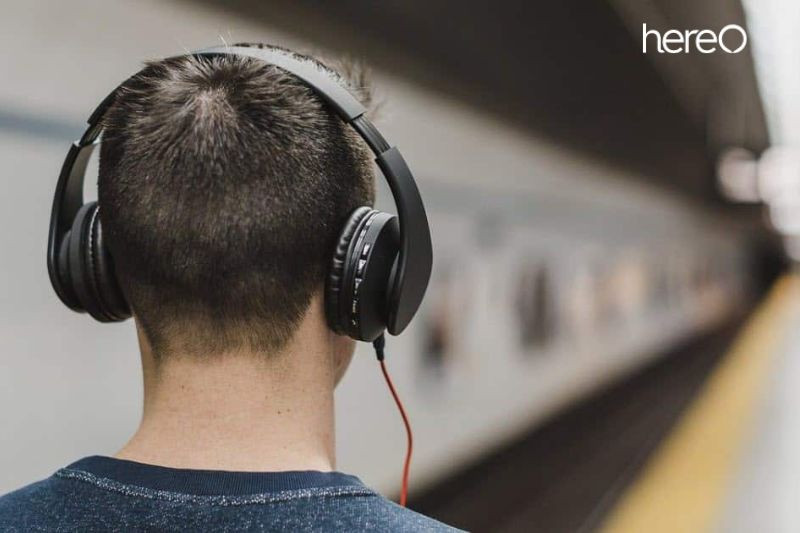
While it’s unlikely that wearing headphones can cause hair loss, they can nonetheless result in several common problems. The most prevalent is hearing damage brought on by extended exposure to loud noise through headphones.
Other problems, such as pain and headaches, might result from using headphones that are the wrong size for your head. This is due to the discomfort they produce by applying pressure to your head and ears.
Selecting headphones that can be altered to fit the size and shape of your head is crucial. Each person has a somewhat different head shape, thus it is important to position the headphones as comfortably as possible.
FAQs about Do Headphones Cause Hair Loss
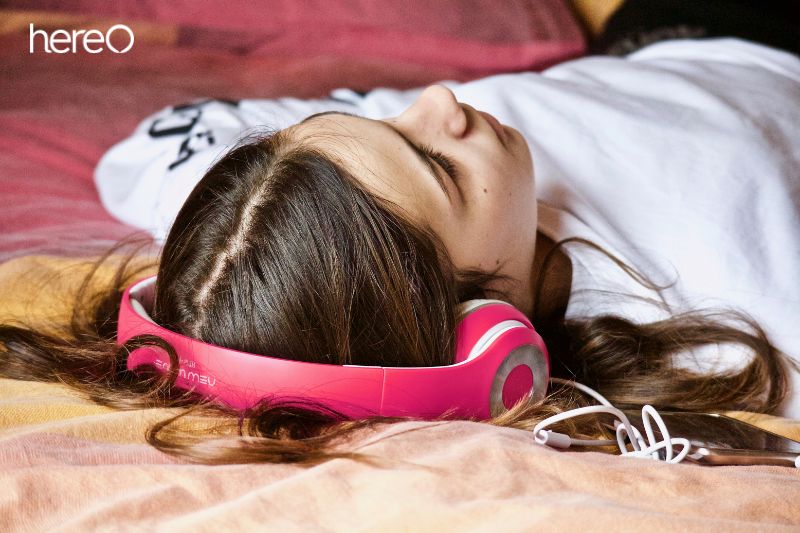
Does wearing headphones for prolonged time cause hair loss?
It is conceivable, but very infrequently. This is related to a disorder known as traction alopecia. Baldness or progressive hair loss brought on by continual pulling on the hair is referred to as traction alopecia.
Can headphones make your hair fall out where they go?
Because they pull on your hair, headphones make the problem of hair loss worse. When your hair is untidy or tough, they do that.
Why does the top of my head hurt after wearing headphones?
If the clamping force on your headphones is too light, it could damage the top of your head. The headband hurts when the headphones are loose because it rests firmly on top of the wearer’s head. Additionally, if the padding on the headphones is inadequate, the top of your head will hurt.
Conclusion
The answer to this question isn’t a simple yes or no. While it’s possible for headphones to cause hair loss, it’s not a direct correlation. Wearing headphones at a comfortable volume, taking breaks from them, and regularly cleaning them can help reduce any risks associated with hair loss.
If you’re concerned about the effects of headphones, it’s best to consult with your doctor to address your individual needs. At the end of the day, headphones are an essential part of many of our lives, so make sure you’re taking the necessary steps to keep both your hearing and your hair healthy!
HereOfamily thank you for reading this article!
